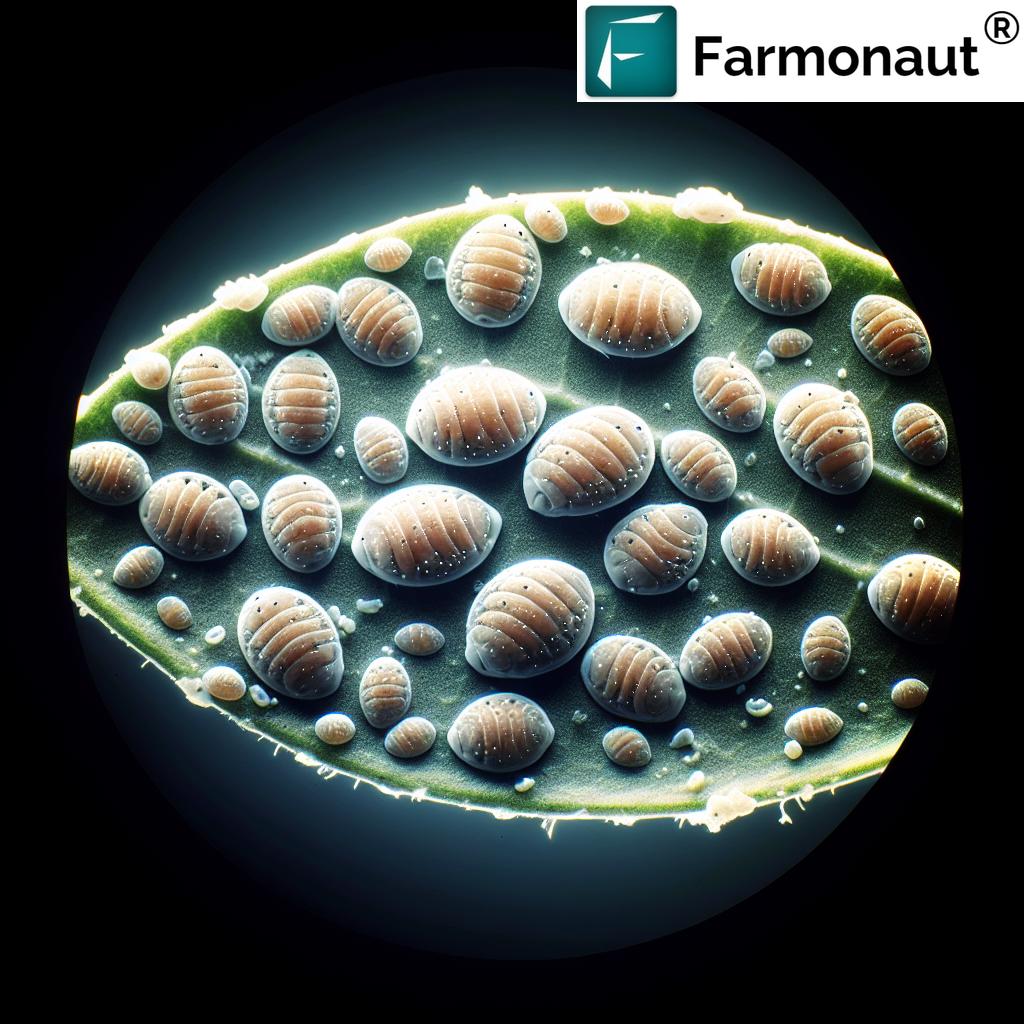Organic Pest Control: Protecting Citrus Crops from Soft Scale Insects (Coccidae Family)

In the world of organic farming, protecting our precious citrus crops from pests is a constant challenge. Among the many threats that our citrus trees face, soft scale insects of the Coccidae family stand out as particularly troublesome. These tiny yet destructive pests can wreak havoc on our orchards if left unchecked. In this comprehensive guide, we’ll delve into the world of soft scale insects, their impact on citrus plants, and most importantly, how we can effectively control them using organic methods.
Understanding Soft Scale Insects: The Coccidae Family
Before we dive into control methods, it’s crucial to understand our adversary. Soft scale insects belong to the Coccidae family, a group of pests known for their soft, waxy coverings. These insects are particularly problematic for citrus growers due to their ability to quickly reproduce and spread throughout an orchard.
- Appearance: Soft scales are typically oval or rounded, with a smooth or slightly ridged surface.
- Size: They range from 1-5 mm in length, making them difficult to spot without close inspection.
- Color: Colors vary but often include shades of brown, yellow, or gray, sometimes blending in with the plant bark.
The Life Cycle of Soft Scale Insects
Understanding the life cycle of soft scale insects is key to implementing effective control measures. The cycle typically includes the following stages:
- Eggs: Females lay hundreds of eggs beneath their protective covering.
- Crawlers: Upon hatching, tiny nymphs (crawlers) emerge and move to find feeding sites.
- Nymphs: As they grow, nymphs settle and begin to develop their characteristic waxy covering.
- Adults: Mature females remain stationary, continuing to feed and reproduce.
How Soft Scale Insects Damage Citrus Plants
Soft scale insects can cause significant damage to citrus plants in several ways:
- Sap Feeding: They use their piercing-sucking mouthparts to feed on plant sap, weakening the host plant.
- Honeydew Production: As they feed, soft scales excrete a sticky substance called honeydew, which can lead to sooty mold growth on foliage and fruits.
- Reduced Vigor: Heavy infestations can lead to yellowing leaves, branch dieback, and reduced fruit production.
- Aesthetic Damage: The presence of scales and sooty mold can make fruits unmarketable for fresh consumption.
Organic Control Methods for Soft Scale Insects
As organic farmers, our goal is to manage soft scale insects without resorting to harmful chemical pesticides. Here are some effective organic control methods:
1. Biological Control
Encouraging natural predators is a cornerstone of organic pest management:
- Ladybugs: Both adults and larvae feed voraciously on soft scales.
- Lacewings: Green lacewing larvae are effective predators of scale insects.
- Parasitic Wasps: Certain species of tiny wasps lay their eggs inside scale insects, controlling populations from within.
To promote these beneficial insects, we can:
- Plant diverse flowering plants to provide nectar and pollen sources.
- Avoid broad-spectrum insecticides that might harm beneficial insects.
- Create insect habitats, such as bug hotels or undisturbed areas in the orchard.
2. Cultural Control
Proper cultural practices can significantly reduce the risk of soft scale infestations:
- Pruning: Regular pruning improves air circulation and reduces hiding spots for scales.
- Proper Irrigation: Avoid over-watering, which can create favorable conditions for scale insects.
- Nutrient Management: Balanced fertilization prevents excessive soft growth that scales prefer.
- Sanitation: Remove and destroy heavily infested twigs and branches to prevent spread.
3. Physical Control
For small-scale infestations or high-value trees, physical removal can be effective:
- Pruning: Selectively remove heavily infested branches.
- Scrubbing: Use a soft brush to physically remove scales from twigs and branches.
- Water Sprays: High-pressure water sprays can dislodge scales, especially during the crawler stage.
4. Organic Sprays and Treatments
When other methods aren’t sufficient, organic sprays can provide additional control:
- Horticultural Oils: Neem oil or other plant-based oils can suffocate scale insects when applied correctly.
- Insecticidal Soaps: These products disrupt the cell membranes of soft-bodied insects like scales.
- Diatomaceous Earth: This fine powder can be dusted on affected areas to desiccate scales.
- Botanical Insecticides: Products derived from plants like pyrethrum or azadirachtin can be effective when used judiciously.
Monitoring and Early Detection
Regular monitoring is crucial for effective soft scale management. Here’s how we can stay vigilant:
- Visual Inspections: Regularly examine twigs, branches, and the undersides of leaves for signs of scales.
- Sticky Traps: Use yellow sticky traps to monitor for crawlers during their active periods.
- Phenology Models: Utilize degree-day models to predict crawler emergence and time control measures accordingly.

Advanced Monitoring with Farmonaut’s Satellite Technology
At Farmonaut, we’re revolutionizing pest detection and management through our advanced satellite-based monitoring system. Our technology offers significant advantages over traditional pest detection methods, especially for large-scale organic citrus operations.
| Feature | Traditional Pest Detection | Farmonaut Satellite System Detection |
|---|---|---|
| Detection Speed | Slow (manual inspections) | Fast (real-time satellite imagery) |
| Accuracy | Variable (depends on inspector’s skill) | High (AI-powered analysis) |
| Coverage Area | Limited (time-consuming for large orchards) | Comprehensive (entire orchard at once) |
| Cost-effectiveness | Low (labor-intensive) | High (automated and scalable) |
Our satellite system can detect subtle changes in plant health that may indicate soft scale infestations before they become visible to the naked eye. This early warning system allows organic citrus growers to:
- Implement control measures at the optimal time
- Target specific areas of the orchard for treatment
- Reduce overall pesticide use by addressing problems early
- Save time and resources on manual scouting
To learn more about how Farmonaut can revolutionize your pest management strategy, visit our application page or explore our API documentation.
Integrating Organic Control Methods with Technology
By combining traditional organic control methods with Farmonaut’s advanced monitoring technology, we can create a comprehensive and highly effective pest management strategy for soft scale insects in citrus orchards. Here’s how this integrated approach might look:
- Continuous Monitoring: Utilize Farmonaut’s satellite imagery to keep a constant watch over your entire orchard.
- Early Detection: Receive alerts when our AI detects patterns consistent with early-stage soft scale infestations.
- Targeted Response: Use the precise location data provided by our system to implement organic control measures exactly where they’re needed.
- Biological Control Enhancement: Use our vegetation health maps to identify areas where beneficial insect populations might need boosting.
- Efficacy Tracking: Monitor the effectiveness of your organic control methods over time using our historical data and analysis tools.
The Future of Organic Pest Control in Citrus Farming
As we look to the future, the integration of advanced technology with time-tested organic farming practices offers exciting possibilities for sustainable citrus production. By leveraging tools like Farmonaut’s satellite monitoring system, organic farmers can:
- Increase the efficiency and effectiveness of their pest control efforts
- Reduce reliance on even organic pesticides through better timing and targeting
- Improve overall orchard health and productivity
- Minimize environmental impact while maximizing crop yields
The fight against soft scale insects and other citrus pests is ongoing, but with a combination of organic methods and cutting-edge technology, we’re better equipped than ever to protect our precious citrus crops.
Conclusion
Managing soft scale insects in organic citrus production requires a multifaceted approach. By combining biological control, cultural practices, physical removal, and judicious use of organic treatments, we can effectively protect our citrus crops from these persistent pests. Regular monitoring, early detection, and prompt action are key to successful management.
Remember, every orchard is unique, and what works best may vary depending on your specific conditions. Don’t hesitate to consult with local agricultural extension services or organic farming associations for advice tailored to your region.
By staying vigilant and employing a diverse range of organic control strategies, we can keep our citrus trees healthy, productive, and free from the damaging effects of soft scale insects. Here’s to bountiful, organic citrus harvests for years to come!
FAQ: Organic Control of Soft Scale Insects in Citrus Crops
Q1: How can I identify soft scale insects on my citrus trees?
A1: Look for small, oval-shaped bumps on twigs, branches, and the undersides of leaves. They may appear in clusters and range in color from brown to yellow or gray. You might also notice sticky honeydew or black sooty mold on leaves and fruits.
Q2: Are soft scale insects harmful to humans?
A2: No, soft scale insects are not directly harmful to humans. However, they can significantly damage citrus trees, reducing fruit quality and yield.
Q3: How often should I inspect my citrus trees for soft scale insects?
A3: Regular inspections are crucial. We recommend checking your trees at least bi-weekly during the growing season, and more frequently if you’ve had past infestations.
Q4: Can I use neem oil to control soft scale insects?
A4: Yes, neem oil can be an effective organic treatment for soft scale insects. It works by suffocating the pests and disrupting their life cycle. Always follow the product instructions for proper application.
Q5: How does Farmonaut’s technology help in managing soft scale insects?
A5: Farmonaut’s satellite-based monitoring system can detect early signs of stress in citrus trees caused by soft scale infestations. This allows for faster response times and more targeted treatment, reducing the overall impact of the pests.
Q6: Are there any natural predators of soft scale insects I can introduce to my orchard?
A6: Yes, ladybugs, lacewings, and certain parasitic wasps are natural predators of soft scale insects. Encouraging these beneficial insects in your orchard can help keep soft scale populations in check.
Q7: How can I prevent soft scale insects from infesting my citrus trees?
A7: Prevention strategies include maintaining healthy trees through proper nutrition and irrigation, regular pruning to improve air circulation, and avoiding the use of broad-spectrum pesticides that might kill beneficial insects.
Q8: Is it possible to completely eradicate soft scale insects from my orchard?
A8: Complete eradication is challenging and often unnecessary. The goal in organic farming is to manage pest populations to keep them below damaging levels rather than eliminate them entirely.
Q9: How do soft scale insects spread between trees?
A9: Soft scale insects primarily spread during their crawler stage when they’re mobile. They can be carried by wind, on birds or insects, or through the movement of infested plant material.
Q10: Can I use the same organic control methods for all types of scale insects?
A10: While many organic control methods are effective against various scale insects, it’s important to identify the specific type you’re dealing with, as some methods may be more effective for certain species.